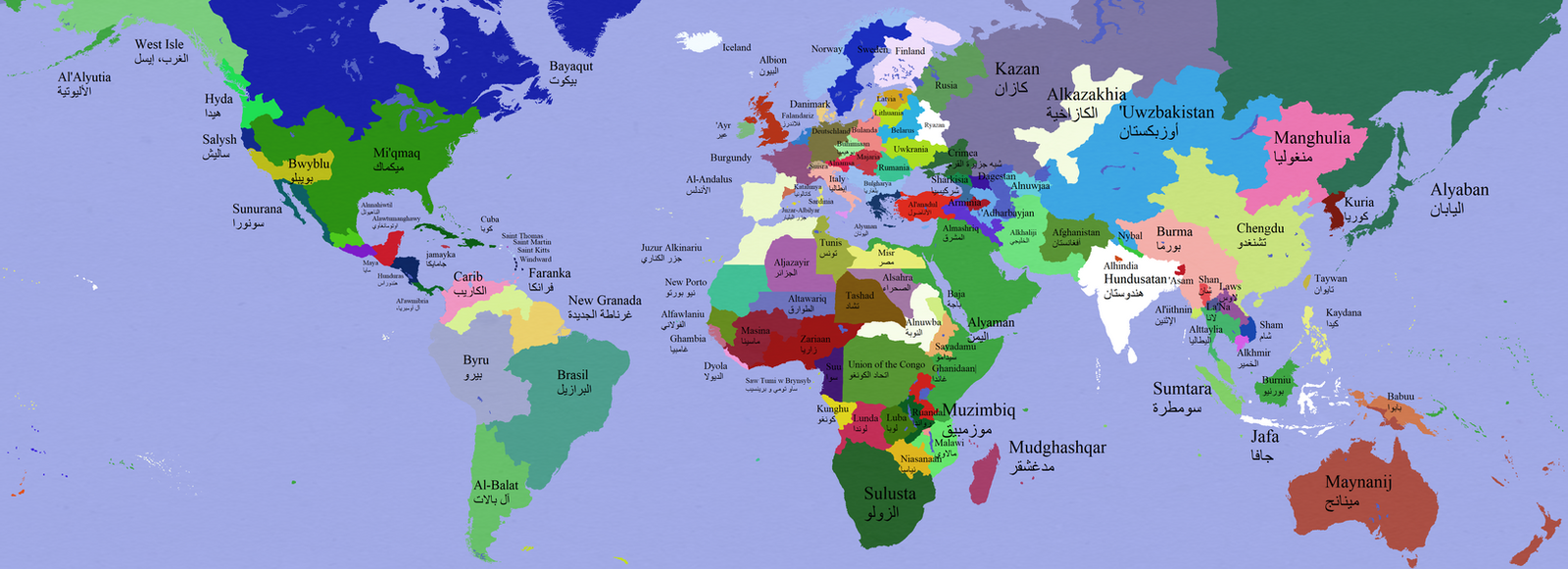HOME | DD
 shellymaps — EU4 Arabia 2000
shellymaps — EU4 Arabia 2000

Published: 2018-02-20 00:32:43 +0000 UTC; Views: 1119; Favourites: 2; Downloads: 2
Redirect to original
Description
The World Map from Jamayka's point of view, the people have been governed by multiple people. The first settlers arrived from England in the late 1500's, originally called "Xaymaca", which was eventually pronounced as "Shamaeca" by the English, the Arabs arrived and dubbed the palce "Jamaka", though early seperetism rose and the inhabitance (a mixed group of people, native, English and Arab descent) declared that "Jamaeqa" would be independent. Arabia didn't acknowledge this for a very long time and still claimed the island. Soon Carib took over, called the Island "Jamayka" and proceeded to influence the island with their own creole culture (which was made up of, once again, Native Caribs, Africans, Arabs and English). Soon enough by the mid 1800's when Arabia slowly started to fall apart, they checked on Jamayka only to be rudely surprised that they were a autonomous region in the country of Carib. This of course would not fly for Arabia and they declared war for Jamayka, though it could be argued that it was in vain since in only 20 years after that, the Island would once again become on its own and permanently become independent as of 1886. The people of Jamayka speak "Jamaykan English", essentially English with many loan-wordsfrom Arabic, Carib, native Xaymacan and Irish. Jamaykans are required to learn Arabic along with English, though are sometimes poked fun of due to their "Jamaykan Accent". Jamayka of course shares to cultural similitaries between them and the other English speaking Caribean countries, though it almost always end in competition on who is better than the other. There's the running gag where "There's the 3 Saints who refuse to make peace. Jamayka who hangs out with foreigners and the Windward Isles who's claim to fame would be that they speak the "Most uncorrupted form of English", but this is once again heavily debated between the Islands.
Arabia awaits upon Al-Andalus to decide what exactly they want to be, like an impatient father figure, they frown at Al-Andalus's answers for their being. Sunnism and "Modern Mozarabic", standardized in 1821. "Not Arabic?" notes one Yemeni official, "No. They with their incomprehensible Maghreb dialects have flirted beyond what is seen as proper. A language of peasants!" Arabia has attempted have the southern part of Andalus rebel and even more hopefully, join Arabia, though neither occured and the country cotinued to thrive with the Mozarabic standardization. Arabs disdainfully speak of their fantasies of "Descendants of Carthage and Rome", but it is also true, to the Arabs that they are indeed the last ones to claim the Umayyad Caliphate. The Andalusians claim that perhaps it is correct to diverge from the original paths, to be something completely new.
Map of the "Arab World".
sta.sh/026vneyjhurr
Green: Arabic is the official language. Purple: Arabic is not the official language, yet Arabian culture is highly prevalent.






















